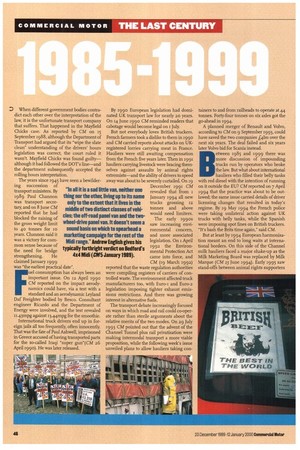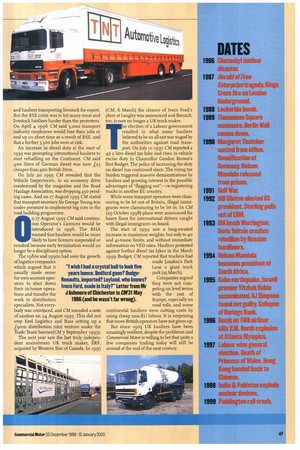THE LAST CENTURY
Page 48

Page 49

If you've noticed an error in this article please click here to report it so we can fix it.
D When different government bodies contradict each other over the interpretation of the law, it is the unfortunate transport company that suffers. That happened in the Mayfield Chicks case. As reported by CM on 15 September '988, although the Department of Transport had argued that its "wipe the slate deanunderstanding of the drivers' hours legislation was correct, the court ruled it wasn't. Mayfield Chicks was found guilty— although it had followed the DOT's line—and the department subsequently accepted the rolling hours interpretation.
The years since 1945 have seen a bewildering succession of transport ministers. By 1989 Paul Channon was transport secretary, and on 8 June CM reported that he had blocked the raising of the gross weight limit to 40 tonnes for i o years. Channon said it was a victory for common sense because of the need for bridge strengthening. He claimed January 1999 was "the earliest practical date".
Fuel consumption has always been an important issue. On 12 April 1990 CM reported on the impact aerodynamics could have, via a test with a standard and an aerodynamic Leyland Daf Freighter bodied by Besco. Consultant engineer Ricardo and the Department of Energy were involved, and the test revealed 11.431111ag against 13.44mP8 for the smoothie.
International truck drivers end up in foreign jails all too frequently, often innocently. That was the fate of Paul Ashwell, imprisoned in Greece accused of having transported parts for the so-called Iraqi "super gun"( CM 26 April 199o). He was later released. By 1990 European legislation had dominated UK transport law for nearly zo years. On 14 June 1990 CM reminded readers that cabotage would become legal on r July.
But not everybody loves British truckers. French farmers took a dislike to them in 1990 and CM carried reportsabout attacks on UKregistered lorries carrying meat in France. Hauliers were still awaiting compensation from the French five years later. Then in 1991 hauliers carrying livestock were bracing themselves against assaults by animal rights extremists—and the ability of drivers to speed away was about to be severely curtailed. On 19 December 1991 CM revealed that from January 1994 all new trucks grossing r2 tonnes and above would need limiters.
The early 1990s saw increasing environmental concern, and more associated legislation. On r April 1992 the Environmental Protection Act came into force, and CM (19 March 1992) reported that the waste regulation authorities were compiling registers of carriers of controlled waste. The environment affected truck manufacturers too, with Euro-1 and Euro-2 legislation imposing tighter exhaust emissions restrictions. And there was growing interest in alternative fuels.
The transport debate increasingly focused on ways in which road and rail could co-operate rather than sterile arguments about the relative merits of the two modes. On 29 July 1993 CM pointed out that the advent of the Channel Tunnel plus rail privatisation were making intermodal transport a more viable proposition, while the following week's issue unveiled plans to allow hauliers taking con
tainers to and from railheads to operate at 44 tonnes. Forty-four tonnes on six axles got the go-ahead in 1994.
A planned merger of Renault and Volvo, according to CM on 9 September r993, could have saved the two companies L4bn over the next six years. The deal failed and six years later Volvo bid for Scania instead.
etween 1985 and 1999 there was more discussion of impounding trucks run by operators who broke the law. But what about international hauliers who filled their belly tanks with red diesel with the intention of running on it outside the EU? CM reported on 7 April 1994 that the practice was about to be outlawed; the same issue carried details of driver licensing changes that resulted in today's regime. By 19 May 1994 the French police were taking unilateral action against UK trucks with belly tanks, while the Spanish were imposing spot fines on British truckers. "It's bash the Brits time again," said CM.
But at least by 1994 European harmonisation meant an end to long waits at international borders. On this side of the Channel milk hauliers faced a major shake-up as the Milk Marketing Board was replaced by Milk Marque (CM 23 June 1994). Early 1995 saw stand-offs between animal rights supporters and hauliers transporting livestock for export. But the BSE crisis was to hit many meat and livestock hauliers harder than the protesters. On April 4 1996 CM said 3,000 transport industry employees would lose their jobs or end up on short time as a result of BS E, and that a further 5,500 jobs were at risk.
An increase in diesel duty at the start of 1995 was prompting international hauliers to start refuelling on the Continent. CM said 400 litres of German diesel was now Las cheaper than 400 British litres.
On July 20 1995 CM revealed that the Vehide Inspectorate, in an economy drive condemned by the magazine and the Road Haulage Association, was dropping 450 pending cases. And on 17 August 1995 CM stated that transport secretary Sir George Young was Under pressure to implement big cuts in the road building programme. On17 August 1995 CM said continuous Operator's Licences would be introduced in 1996. The RHA warned that hauliers would be more likely to have licences suspended or revoked because early termination would no longer be a disciplinary option.
The 198os and 19905 had seen the growth of logistics companies which argued that it usually made sense for own-account operators to shut down their in-house operations and transfer the work to distribution specialists. Not everybody was convinced, and CM sounded a note of caution on 24 August 1995. This did not stop Exel Logistics and Bass setting up a L9 om distribution joint venture under the Trade Team banner(CM 7 September 1995).
The next year saw the last truly independent mainstream UK truck maker, ERF, acquired by Western Star of Canada. In 1997
(CM, 6 March) the closure of Iveco Ford's plant at Langley was announced and Renault, too, is now no longer a UK truck maker. The election of a Labour government resulted in what some hauliers believed to be an all-out war waged by the authorities against road transport. On July to 1997 CM reported a 4p a litre diesel tax hike and rises in vehicle excise duty in Chancellor Gordon Brown's first Budget. The policy of increasing the duty on diesel has continued since. The rising tax burden triggered massive demonstrations by hauliers and growing interest in the possible advantages of "flagging out—re-registering trucks in another EU country.
While some transport operators were clamouting to be let out of Britain, illegal immigrants were clamouring to be let in. In CM (29 October 1998) plans Were announced for heavy fines for international drivers caught with illegal immigrants on board.
The start of 1999 saw a long-awaited increase in maximum weights, but only to 40 and 41-tonne limits, and without immediate information on VED rates. Hauliers protested against further diesel tax hikes in the March 1999 Budget; CM reported that truckers had made London's Park Lane a giant truck park (25 March).
Companies argued they were not competing on level terms with the rest of Europe, especially on road tolls, and some continental hauliers were cutting costs by using cheap non-EU labour. It is surprising that more British operators have not given up.
But since 1905 UK hauliers have been amazingly resilient, despite the problems; and Commercial Motor is willing to het that quite a few companies trading today will still be around at the end of the next century.
DATES
1986 Chernobyl nuclear disaster, 7 ileraidefFree Enterprisetragedy. Kings Cress the on London Inderground.
1988 todterbie bomb. 1989 lianamnen Square
massacre. Bertht Wall mites doom.
1990 Matgaret Thatcher gusted from office. Reunification of Germany. Nelson Mandela released from Om 1991 Gulf War.
1992 Clinton elected US president. Sterling pulls out of ERM.
1993 IRA bomb Warrington. Boris Yettsin crushes rebellion by Russian hardliners.
1994 Ndson Mamlela becomes president of South Africa.
1995 Kobe earthquake. Israeli premier Yitzhak Rabin assassksatet &I Simpson found not guilty Collapse of brings Bank.
1996 Bomb on TWA airliner Idlis 238. Bomb explodes
at Atlanta Olympics.
1997 Labour wins general election. Death of Princess of Wales. Hong Kong handed back to Chinese.
1998 India & Pakistan explode nuclear devices.
1999 Paddington rail crash.




















































































































































